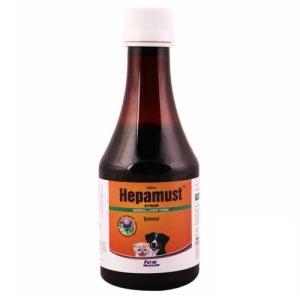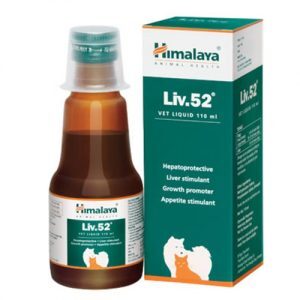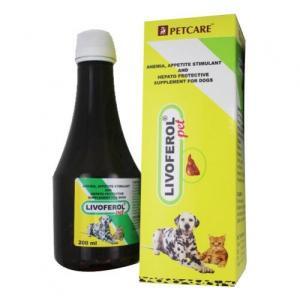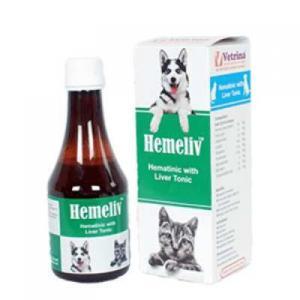Table of Contents
Liver problems in dogs refer to a range of conditions that affect the liver’s normal functioning. These issues can include infections, inflammation, toxins, genetic disorders, or cancerous growth in the liver. One common liver problem in dogs is hepatic lipidosis, where excess fat accumulates in the liver, leading to dysfunction. Another serious condition is canine liver cirrhosis, characterized by scarring and reduced liver function due to long-term damage. Early diagnosis and appropriate veterinary care are crucial for managing liver problems and ensuring a better prognosis for affected dogs.

What Types of Liver Problems Do Dogs Have?
Dogs can experience various types of liver problems, some of which include:
- Hepatitis: Chronic hepatitis in dogs is an inflammation of the liver, often caused by viral infections or immune-mediated diseases.
- Hepatic Lipidosis: Do dogs get fatty liver disease? This condition occurs when excessive fat accumulates in the liver, hindering its normal function.
- Liver Shunts: Congenital liver shunts are abnormal blood vessels bypassing the liver, leading to toxins in the bloodstream.
- Liver Cirrhosis: Long-term liver damage can result in scarring (fibrosis) and impaired liver function, leading to cirrhosis.
- Liver Tumors: Dogs can develop both benign and malignant tumors in the liver, which can affect its proper functioning.
- Cholangitis: Inflammation of the bile ducts within the liver can lead to cholestasis in dogs, causing bile flow obstruction.
- Toxin-induced Liver Damage: Ingestion of particular liver medicine for dogs, plants, or toxic substances can cause liver damage in dogs.
- Infections: Bacterial or parasitic infections can also affect the liver and its ability to function correctly.
- Autoimmune Hepatitis: This is a condition where the dog’s immune system attacks its liver cells, leading to inflammation and damage.
- Copper Storage Disease: Certain dog breeds are prone to copper accumulation in the liver, leading to toxicity and liver dysfunction.
The symptoms of liver problems in dogs can vary depending on the specific condition. Still, they may include vomiting, diarrhea, loss of appetite, lethargy, jaundice (yellowing of the eyes and gums), increased thirst and urination, and abdominal discomfort. If you suspect your dog has any liver-related issues, seeking prompt veterinary attention for proper diagnosis and treatment is essential.
Acute Liver Failure in Dogs
What can cause acute liver failure in dogs?
Acute liver failure in dogs refers to the sudden and severe impairment of liver function. It is a life-threatening condition that requires immediate veterinary attention. Acute liver failure can have various causes, including infections, toxins, medications, or other underlying liver diseases.
Dog liver disease stages can be generalized as follows:
- Initial Stage: This is the initial phase when the dog starts showing symptoms of liver failure. Common signs include vomiting, diarrhea, loss of appetite, lethargy, and jaundice. The liver is significantly impaired at this point, and its ability to perform essential functions is compromised.
- Hepatic Encephalopathy: As the condition progresses, toxins that the liver filters typically from the bloodstream can build up and affect the brain, leading to hepatic encephalopathy. This stage is characterized by neurological symptoms such as disorientation, confusion, circling, head pressing, seizures, and altered behavior.
- Critical Stage: The liver function is severely compromised at this stage, and the dog’s condition deteriorates rapidly. The dog may experience severe neurological signs, become comatose, or even go into a hepatic coma. The liver’s inability to regulate blood clotting can lead to bleeding disorders, increasing the risk of internal bleeding.
- Recovery or Fatal Outcome: Depending on the underlying cause, the dog may either show signs of improvement with aggressive treatment or continue to deteriorate, leading to a fatal outcome. Dogs that survive the critical stage may require ongoing management and supportive care for their liver function.
You must seek immediate veterinary attention if you suspect your dog is experiencing acute liver failure. Early diagnosis and intervention can significantly improve the chances of a successful outcome. Treatment may include addressing the underlying cause, providing supportive care, administering medications to manage symptoms, and implementing a diet to support liver function.
Symptoms and Signs of Liver Disease in Dogs
What are the symptoms of liver disease in dogs? What causes a large liver in dogs?
Liver disease in dogs can present with various symptoms and signs, and the severity and specific manifestations can vary depending on the underlying condition. Some common symptoms and signs of liver disease in dogs include:
- Yellowing of the skin, whites of the eyes, and gums due to an accumulation of high bilirubin in dogs, a pigment produced by the liver.
- Dogs with liver disease may show a decreased interest in food or refuse to eat altogether.
- Gastrointestinal disturbances are common in dogs with liver problems, leading to vomiting and diarrhea.
- Liver disease can cause increased thirst (polydipsia) and frequent urination (polyuria).
- Dogs with liver issues may appear lethargic, weak, or reluctant to engage in usual activities.
- The abdomen may become swollen or distended due to fluid accumulation (ascites) caused by liver dysfunction.
- Neurological symptoms can occur, leading to disorientation, confusion, head pressing, circling, or seizures.
- Unintended weight loss can occur in dogs with liver disease.
- Changes in urine color or consistency can be observed due to altered liver function.
- Liver dysfunction can affect the color and consistency of stools, leading to pale or grayish stools.
- The liver plays a vital role in blood clotting, so dogs with liver disease may be more prone to bleeding or bruising.
- Some dogs with liver disease may have foul-smelling breath (halitosis).
These symptoms can also indicate other health issues, so proper diagnosis by a veterinarian is essential. If you notice any of these signs in your dog, seek immediate veterinary attention for a thorough examination, diagnosis, and appropriate treatment.
What Causes Liver Problems
Various factors can indeed cause liver problems in dogs. Here is the information about some of them.
Stress
While stress itself may not directly cause liver problems, chronic stress can impact a dog’s overall health, including the liver’s function, as stress hormones can affect liver metabolism.
Poor Nutrition
Diets lacking essential nutrients or containing harmful substances can lead to liver damage over time. Ask your veterinarian how to put weight on a dog with liver disease.
Endocrine Disease
Certain endocrine disorders like Cushing’s disease or diabetes can affect liver function and lead to liver problems.
Copper Toxicity
Some dog breeds are genetically predisposed to accumulating excessive copper in their livers, leading to copper-associated liver diseases.
Trauma
Severe trauma, such as a direct blow to the abdomen or a car accident, can cause liver damage.
Infectious Agents
Bacterial, viral, or parasitic infections can lead to hepatitis or other liver-related illnesses.
Pharmaceuticals
Certain medications or drugs can be hepatotoxic (toxic to the liver) and, if not used correctly or in overdose cases, can cause liver damage.
Vaccinosis
Vaccinosis is a term some holistic veterinarians use to describe adverse reactions or complications from vaccinations, potentially affecting liver function.
Some dogs may be more susceptible to liver problems due to their breed, genetics, or pre-existing health conditions. Additionally, a combination of factors can contribute to liver issues. If you suspect your dog has liver problems or any health-related concerns, seeking veterinary attention for proper diagnosis and treatment is crucial. You may ask your veterinarian about elevated liver enzymes in dogs what does it mean. And what are the symptoms of high liver enzymes in dogs?
Is There Treatment for Liver Disease in Dogs?
Various treatments are available for liver disease in dogs, and the specific approach depends on the underlying cause and the severity of the condition. How to fix liver problems in dogs? Here are some standard treatment options.
Diet Changes
Dietary management is a fundamental aspect of managing liver disease in dogs. Veterinarians may recommend special prescription diets formulated to support liver function and minimize the workload on the liver. What dog food is best for dogs with high liver enzymes? These diets typically have reduced protein levels, easily digestible carbohydrates, and added antioxidants.
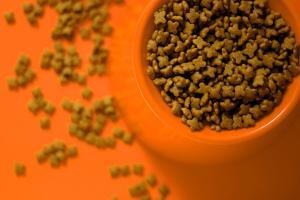
Antibiotics
Antibiotics may be prescribed to combat the infection and prevent further complications if the liver disease is caused by bacterial infections or complications arising from liver dysfunction.
Surgery
In some cases, surgical intervention may be necessary to remove liver tumors, address liver shunts, or drain fluid accumulation (ascites) in the abdomen caused by liver dysfunction.
Medications
Depending on the specific liver disease, veterinarians may prescribe medications to manage symptoms, reduce inflammation, and support liver function.
Fluid Therapy
Intravenous or subcutaneous fluid therapy may be required in cases where a dog is dehydrated or has fluid accumulation due to liver dysfunction.
Management of Underlying Conditions
If the liver disease is secondary to another health issue, such as endocrine disease or copper toxicity, treating the underlying cause is crucial for successful liver disease management.
Supportive Care
Dogs with severe liver disease may require supportive care, such as hospitalization, to stabilize their condition, manage complications, and monitor their progress closely.
Supplements
How to cure liver disease in dogs naturally? Certain supplements can help support liver health in dogs. These may include antioxidants like Vitamin E and Vitamin C, SAMe (S-adenosylmethionine), milk thistle, and other hepatoprotective agents. Always consult a veterinarian before giving any supplements to your dog, as some may not be suitable for certain liver conditions.
Hepamust Syrup, 200 ml (Silybum Marianum, Tephrosia Purpurea, solanum Nigrum)
Hepamust Syrup is a liver tonic formulated with 15 unique herbs, offering a high level of palatability. Among its key ingredients, Silybum Marianum is vital in supporting hepatic tissue regeneration. Tinospora Cardifolia offers protection against harmful toxins, while Phyllanthus Niuri shields liver cells from oxidative stress. This potent blend makes Hepamust Syrup beneficial for managing idiopathic liver disorders, anorexia, and debility in pets. Additionally, it contributes to promoting healthy hair coats and vibrant skin, enhancing the overall well-being of our beloved furry companions.
The recommended dosage of the syrup varies depending on the pet’s weight and should be administered 2 – 3 times a day as follows:
- For pets weighing up to 5 kg: 0.5 tsp.
- For pets weighing 5 to 15 kg: 1 tsp.
- For pets weighing 15 to 25 kg: 1.5 tsp.
- For pets weighing 25 to 50 kg: 2 to 3 tsp.
- For pets weighing above 50 kg: 2 tbsp.
Herbal supplements for the liver in dogs can offer several benefits. They support liver function and help in detoxifying the organ, promoting overall liver health. Certain herbs have shown potential in aiding liver cell regeneration and protecting against toxins. Lastly, herbal supplements with antioxidant properties can help reduce oxidative stress in the liver, improving liver function and well-being in dogs.
Give the appropriate amount based on your pet’s weight to ensure safe and effective syrup usage.
Liv.52 Vet Liquid, 110 ml (Caper Bush, Chicory)
Liv.52 Vet Liquid is a well-known liver tonic manufactured by the Himalaya Drug Company for veterinary use. Its active components contain natural ingredients such as Caper Bush (Capparis spinosa) and Chicory (Cichorium intybus). Caper Bush (Capparis spinosa): It is known for its hepatoprotective properties and may help support liver function, promote detoxification, and reduce inflammation. Chicory (Cichorium intybus): Chicory is believed to have antioxidant properties, which can help reduce oxidative stress and support liver health.
Liv.52 Vet Liquid is formulated to support animal liver health and function. The active ingredients, Caper Bush and Chicory, protect liver cells from damage caused by toxins and free radicals. Additionally, they may help enhance liver metabolism and promote the regeneration of liver tissues, thus supporting the overall well-being of the liver.
Liv.52 Vet Liquid is generally considered safe when used as directed. However, individual animals may have different sensitivities or reactions to certain ingredients. While side effects are rare, some animals may experience mild gastrointestinal upset, such as vomiting or diarrhea. If any adverse reactions are observed, it is essential to discontinue use and consult a veterinarian on how to help your dog with liver disease.
Liv.52 Vet Liquid offers various benefits for animals with liver concerns, including:
- Liver Support: The herbal blend may help maintain liver health and function by protecting liver cells and promoting detoxification processes.
- Hepatoprotective: The active ingredients work as hepatoprotective agents, guarding the liver against damage caused by toxins and oxidative stress.
- Improved Liver Metabolism: Liv.52 Vet Liquid may enhance liver metabolism, which is essential for various metabolic processes in the body. You may combine this supplement with a liver detox diet for dogs.
- Liver Tissue Regeneration: The tonic may support the regeneration of liver tissues, facilitating the liver’s ability to recover from mild damage or stress.
Livoferol Pet, 200ml (Ferrous Gluconate, Ferrous Chloride, Riboflavine)
Pet Care Livoferol Supplement enhances liver efficiency by regulating hepatic microsomal enzymes. This supplement promotes a healthy liver, improving your pet’s appetite, digestion, and sleep. Additionally, Livoferol’s inclusion of Vitamin B further supports your pet’s metabolism, contributing to their overall well-being.
Active Ingredients
- Ferrous Gluconate: Ferrous Gluconate is an iron supplement that addresses iron deficiencies in dogs. Iron is essential for red blood cell production and oxygen transport, supporting overall vitality.
- Ferrous Chloride: Like Ferrous Gluconate, Ferrous Chloride is another iron supplement used to support dogs with iron-deficiency anemia, helping optimize their blood health.
- Riboflavin (Riboflavin): Riboflavin, also known as Vitamin B2, plays a crucial role in energy metabolism and supports various enzymatic processes, contributing to the overall well-being of the dog’s liver and body.
These active ingredients work synergistically to promote liver health, improve energy levels, and address potential deficiencies, enhancing dogs’ overall vitality and health.
Hemeliv, 30ml (Ferrous Ascorbate, Folic Acid, Vitamin B12, Cobalt)
Hemeliv is a supplement formulated with essential active ingredients to support blood health and overall dog well-being. The key active ingredients include:
- Ferrous Ascorbate: This is a form of iron combined with ascorbic acid (Vitamin C), which enhances iron absorption and helps produce hemoglobin, supporting healthy red blood cell formation.
- Folic Acid: Folic acid is a B vitamin, vital in DNA synthesis and red blood cell production. It helps prevent anemia and supports healthy cell growth and division.
- Vitamin B12: Also known as cobalamin, Vitamin B12 is essential for proper nerve function, DNA synthesis, and red blood cell formation.
- Cobalt: Cobalt is a trace mineral that contributes to Vitamin B12 synthesis, further contributing to red blood cell production.
Hemeliv works by providing crucial nutrients that are essential for blood health. The combination of Ferrous Ascorbate and Folic Acid helps improve iron absorption and supports the formation of healthy red blood cells. Vitamin B12 and Cobalt further aid in red blood cell production and overall blood health.
Hemeliv is generally safe for dogs when used as directed and has a low risk of side effects. However, some dogs may experience mild gastrointestinal upset, such as vomiting or diarrhea. If any adverse reactions occur, discontinue use and consult a veterinarian.
The benefits of Hemeliv include:
- Blood Health: Hemeliv supports blood health by promoting the production of red blood cells and preventing anemia.
- Energy and Vitality: By improving blood health and oxygen-carrying capacity, Hemeliv may enhance a dog’s energy levels and overall vitality.
- Nutritional Support: Hemeliv provides essential nutrients like iron, folic acid, and Vitamin B12, which are crucial for various physiological processes in the body.
- Overall Well-Being: A healthy blood system contributes to a dog’s overall well-being, ensuring the proper functioning of organs and tissues.
It’s important to note that while these supplements can benefit liver health, they are not a substitute for professional veterinary advice. If your pet has any existing liver conditions or health concerns, consult a veterinarian before using supplements or medications, including herbal products. Additionally, dosages and usage instructions should be followed per the product’s label or as a veterinarian recommends.
FAQ
Are Dogs in Pain When They Have Liver Failure?
Dogs with liver failure may experience discomfort and pain due to the underlying condition and its effects on the body. However, pain perception can vary among individual dogs, and some may show subtle signs of pain, while others may exhibit more obvious symptoms. If you suspect your dog is in pain, it’s crucial to consult a veterinarian for a proper evaluation and appropriate pain management.
What Is the Life Expectancy of a Dog with Liver Disease?
The life expectancy of a dog with liver disease can vary significantly depending on the type and severity of the liver disease, the underlying cause, and how early it is diagnosed and treated. Some dogs with manageable liver conditions can have a relatively normal life span with proper care. In contrast, others with more severe or advanced liver disease may have a shorter life expectancy. Working closely with a veterinarian to manage the condition and provide the best possible quality of life for the dog is essential.
How Common is Liver Disease in Dogs?
Liver disease is relatively common in dogs and can result from various factors, including infections, toxins, genetics, and other underlying health conditions. It’s considered one of the top health concerns for dogs, and early detection and appropriate management are critical for improving outcomes.
How Serious is Liver Disease in Dogs?
Liver disease in dogs can range from mild and manageable conditions to severe and life-threatening illnesses. The seriousness of liver disease depends on the specific diagnosis, the extent of liver damage, and how well the dog responds to treatment. Some liver diseases can be managed with proper care and medical intervention, while others may have a more guarded prognosis.
Which Is Better for Dogs: Cod Liver Oil or Fish Oil?
Both cod liver oil and fish oil can benefit dogs, but they serve different purposes. Cod liver oil is a good source of vitamins A and D and Omega-3 fatty acids. Fish oil, on the other hand, is primarily a rich source of Omega-3 fatty acids. Omega-3 fatty acids offer various health benefits for dogs, including supporting skin and coat health, joint function, and overall well-being. It’s best to choose a high-quality fish oil supplement specifically formulated for pets and consult a veterinarian to determine the appropriate dosage for your dog’s needs.


